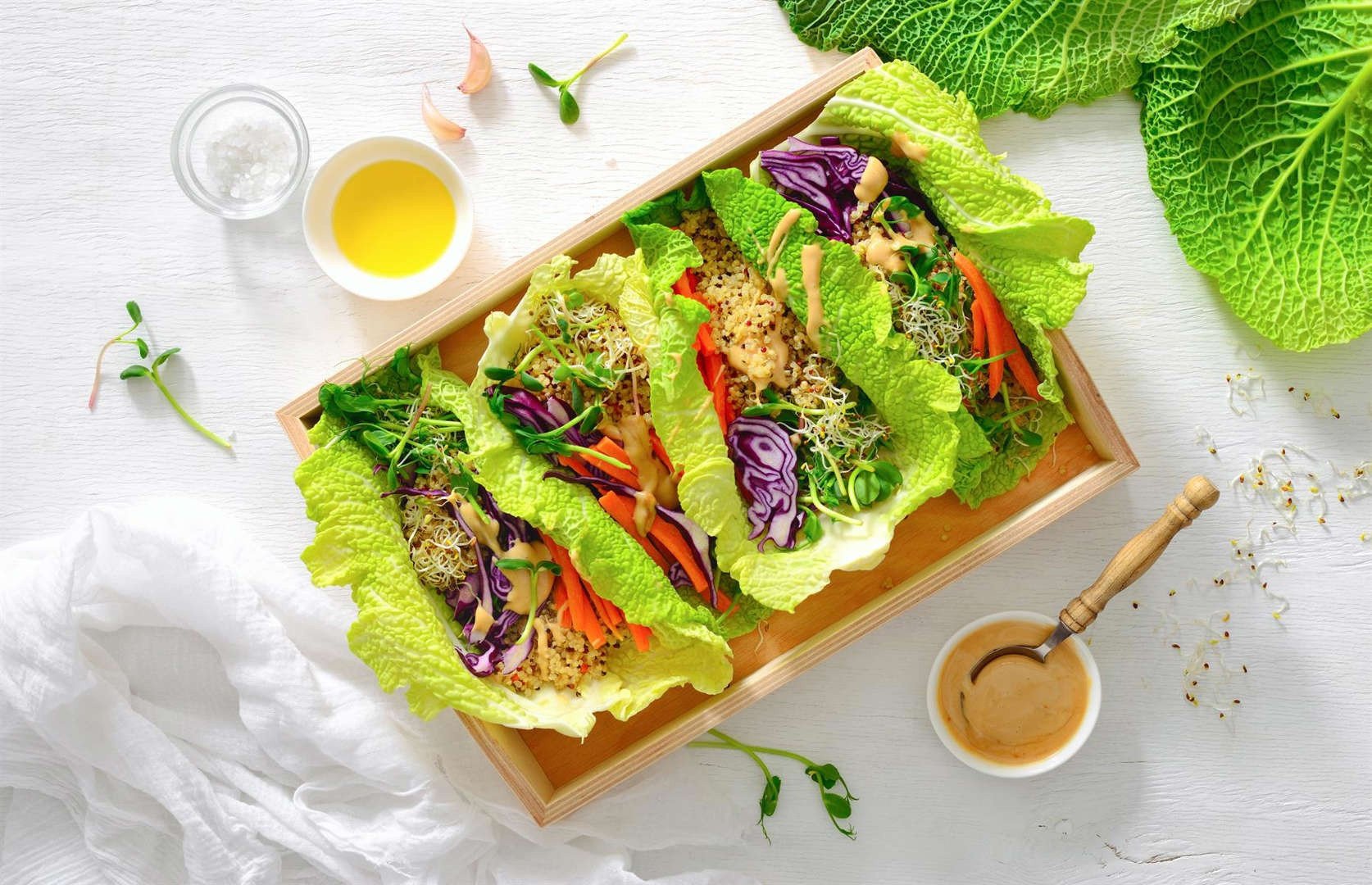17 Simple Food Swaps for Effortless Healthy Eating
We’re all striving to find simple ways to live healthier without overhauling everything we eat. Fortunately, you don’t need to completely revamp your diet to see improvements. Small food swaps can make a big difference, whether you're looking to cut calories, add more nutrients, or reduce sugar and fat.
Here are 17 easy food switches to help you eat healthier effortlessly.
Lettuce Cups
 Shutterstock
Shutterstock
A quick and effective way to reduce calories from carbs is by replacing traditional wheat tortillas with lettuce. Any of your favorite fillings, whether meat or veggies, can be wrapped in these lighter, fresh lettuce leaves. For a delicious and satisfying option, try slow-cooked ground pork with a flavor kick of ginger, soy, and fish sauce.
Shutterstock
Substitute regular rice with cauliflower rice to lower carbs and calories while adding an extra serving of vegetables to your meal. To prepare, simply chop cauliflower into small pieces and pulse it in a food processor. You can either microwave it for 3 minutes or roast it with a little oil at 400°F for 12 minutes. For a bolder flavor, consider a spiced cauliflower rice like kheema-style.
Shutterstock
Blend frozen banana slices in a high-powered blender for a creamy, low-calorie alternative to traditional ice cream. This banana "ice cream" has no added sugar and contains fewer than 100 calories per serving, while also counting as a serving of fruit. In comparison, a serving of Ben & Jerry’s Cookie Dough ice cream has 235 calories and 8g of saturated fat.
Shutterstock
For a healthier twist on classic cocktail blinis, top slices of fresh cucumber with cream cheese and smoked salmon. This combination is not only light and refreshing but also contains about 20 fewer calories than the typical flour-based blinis.
Shutterstock
Choosing Brie over Cheddar in sandwiches can help you cut 33 calories per 45g serving. While Brie has slightly less calcium, it is richer in folate, a nutrient that helps combat fatigue.
Shutterstock
While peanut butter is a good choice, tahini, made from sesame seeds, is even better. A 15g tablespoon of tahini contains 57mg of magnesium, compared to 27mg in peanut butter. Magnesium is crucial for muscle and nerve function, and many women don’t get enough of it in their daily diet.
Shutterstock
Elevate the nutritional value of a Caesar salad by replacing iceberg lettuce with nutrient-packed baby kale. Kale is an excellent source of vitamin A, calcium, and iron. A serving of 80g kale provides 420mcg of vitamin A, which is 52% of the daily recommended intake for immune health.
Shutterstock
Instead of traditional pasta, try zucchini noodles (or "zoodles") to slash calories. A plate of zoodles with beef bolognese sauce will only have about 300 calories compared to around 700 calories from regular spaghetti. You can buy pre-made zucchini noodles in stores, or make your own using a spiralizer.
Shutterstock
Add a small handful of almonds to your salad to replace croutons. Almonds offer a satisfying crunch and provide more protein, healthy fats, and fiber. They’re also rich in magnesium, potassium, and iron, making them a great nutritional boost for your meals.
Shutterstock
For a lower-calorie alternative to roasted sweet potatoes, try butternut squash. A 150g serving of roasted butternut squash has 115 fewer calories than the same amount of roasted sweet potatoes. Butternut squash is also a fantastic source of vitamin A.
Natural Greek yogurt is a great swap for regular yogurt as it’s strained and contains more protein. A 100g serving of fat-free Greek yogurt has just 57 calories, but it curbs your appetite better and keeps you full longer compared to standard yogurt.
Shutterstock
Switch your regular breakfast cereal for All Bran to boost your fiber intake. A 40g serving of All Bran contains 11g of fiber, significantly more than the 4.2g in a similar portion of bran flakes. Fiber supports digestive health and helps prevent colon cancer
Shutterstock
Red peppers are not only more vibrant than green ones, but they also pack a higher amount of vitamin A. A 160g red pepper provides 20% of the daily recommended intake of vitamin A, which is important for immune system, eye, and skin health.
Shutterstock
Transform a tortilla into a low-calorie pizza base. Top with spinach, mozzarella, and egg for a satisfying pizza that’s around 500 calories. It’s a much healthier option compared to traditional pizza dough.
Shutterstock
Shrimp is a great source of lean protein and makes for a fantastic base in a low-fat curry. Combine shrimp with tomatoes, mustard seeds, and minimal oil for a much healthier alternative to a heavy chicken tikka masala or korma.
Shutterstock
Swap yellow onions for red onions to get a boost of antioxidants. Red onions are known for their high levels of quercetin and anthocyanins, which can help combat cancer cells in lab studies. While more research is needed, red onions are a potent addition to your diet.
Replace mayonnaise with smashed avocado in wraps, salads, and sandwiches. Avocado provides a creamy texture while saving you 136 calories per serving. Two tablespoons of full-fat mayo have 193 calories, while the same amount of smashed avocado only has 57 calories.
By swapping out a few common ingredients with these easy and nutritious alternatives, you can instantly improve your diet and health without much effort. Whether you’re aiming to cut calories, increase protein, or add more vitamins to your meals, these small changes will help you reach your health goals with ease.